Space
Sign up for our newsletter
We summarize the week's scientific breakthroughs every Thursday.
- Astronomy
Astronomers saw a rogue planet going through a rapid growth spurt
The growth spurt hints that the free-floating object evolves like a star, providing clues about rogue planets’ mysterious origins.
- Astronomy
See a 3-D map of stellar nurseries based on data from the Gaia telescope
The map, spanning 4,000 light-years from the sun in all directions, combines a chart of space dust with the effects of a rare type of young, hot star.
-
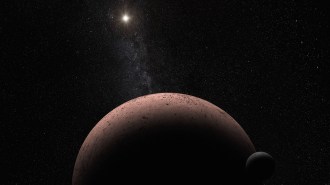 Planetary Science
Planetary ScienceDwarf planet Makemake sports the most remote gas in the solar system
The methane gas may constitute a rarefied atmosphere, or it may come from erupting plumes on Makemake’s surface.
By Ken Croswell - Space
This black hole flipped its magnetic field
Event Horizon Telescope data reveal the magnetic field around M87* shifted, weakened and then flipped, defying theoretical expectations.
-
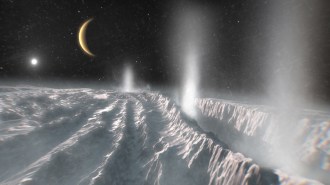 Planetary Science
Planetary ScienceEnceladus’ ocean may not have produced precursor chemicals for life
Building blocks of life have been found on this moon of Saturn. They may come from chemical reactions beyond Enceladus’ possible life-supporting ocean.
-
 Particle Physics
Particle PhysicsA primordial black hole may have spewed the highest energy neutrino ever found
The Big Bang may have spawned these theoretical black holes, whose lives are thought to end in a burst of extremely energetic particles.
-
 Space
SpaceHow a Harvard maverick forever changed our concept of the stars
At just 25, Cecilia Payne-Gaposchkin applied quantum physics to a treasure trove of astronomical observations to show that stars are mostly hydrogen and helium.
By Elise Cutts -
 Planetary Science
Planetary ScienceFuture Martians will need to breathe. It won’t be easy
Asteroid impacts, microbes, mining: These are a few tactics engineers might one day use to create an Earthlike atmosphere on Mars.
- Physics
A ‘ringing’ black hole matches scientists’ predictions
Gravitational waves emitted after two black holes coalesced agree with theories from physicists Stephen Hawking and Roy Kerr.
-
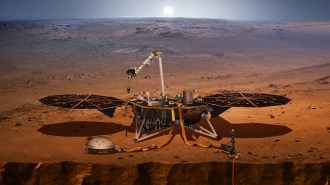 Planetary Science
Planetary ScienceSeismic waves suggest Mars has a solid heart
NASA’s InSight lander listened to Marsquakes for four years. The tremors revealed that Mars may have a solid inner core.
-
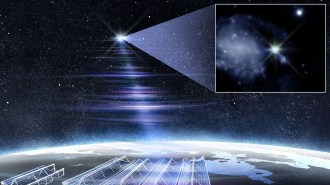 Astronomy
AstronomyAstronomers detect the brightest ever fast radio burst
The fast radio burst came from 130 million light-years away. That proximity allowed an in-depth search for what produced the mysterious signal.
-
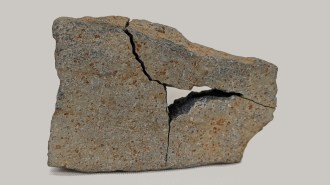 Planetary Science
Planetary ScienceA Mars rock analysis tool proved its mettle on a chance find from Arizona
On Mars, the Perseverance rover found a spotted rock that could bear signs of ancient life. On Earth, a researcher used a lookalike for a dry run.